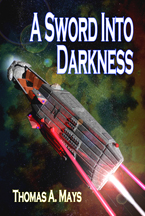The novel “A Sword Into Darkness” is, in a word, shamelessly badass.
If you’re looking for a wonderful hard-military-sci-fi adventure tale, then look no further. Author Thomas A. Mays deploys a literary strategy of scientific realism, highly focused characterization, relentless plot pacing, and gorgeous language to spin a tale of fascinating space mystery.
The story concerns a scarred naval veteran who is called upon by an eccentric millionaire to help him build Earth’s first space navy, based upon the shaky evidence of an object on approach from lightyears away. In grueling detail, no astrophysical conundrum is left unaddressed as Mays, who has a pair of physics degrees and is himself a Navy veteran, clearly knows what he’s talking about. I particularly enjoyed the expert-level techno-babble.
Mays’ characters are constructed subtly, so that by the book’s end you’ve come to know (and fall in love with) a slew of deeply human-feeling fictional people.
“A Sword Into Darkness” is fiction at its most sciencey-est…
treating everything realistically, from photon drives to PTSD. And while any reader appreciates understanding how things in the story are supposed to work, at times it comes across a bit didactically.
As someone who is over-critical of endings, I can tell you that this ending is extremely satisfying. It has true surprises, clever twists, and is brilliantly unpredictable right up until the end.
In only a few places did Mays take a writerly shortcut get a point across too abruptly, or did I encounter a redundancy or the like. Ultimately my greatest technical dispute lies with a few bits of awkward dialogue.
Outside petty technical issues, though, I found the whole novel in general tended toward a distinctly “US Navy” perspective. And while overall that’s not a bad thing in and of itself, I found it odd that seemingly no one in the book espoused much of a contrarian point of view. There are tons of disputes which occur within that naval mindset, but not any outside it. For example, there are radio talk-show hosts, civilian politicians, and non-military science personnel who are all unaccountably well-acquainted with naval terminology and strategic military thinking. Overall I feel the book suffered from the lack of counter-perspective. An opposing viewpoint could’ve helped to strengthen the moral argument of the story, while its exclusion left it feeling a little lop-sided, logically.
But compared with what Mays has done well, this is a small point indeed. I highly recommend “A Sword Into Darkness,” and will look eagerly toward what Thomas Mays puts out next.
